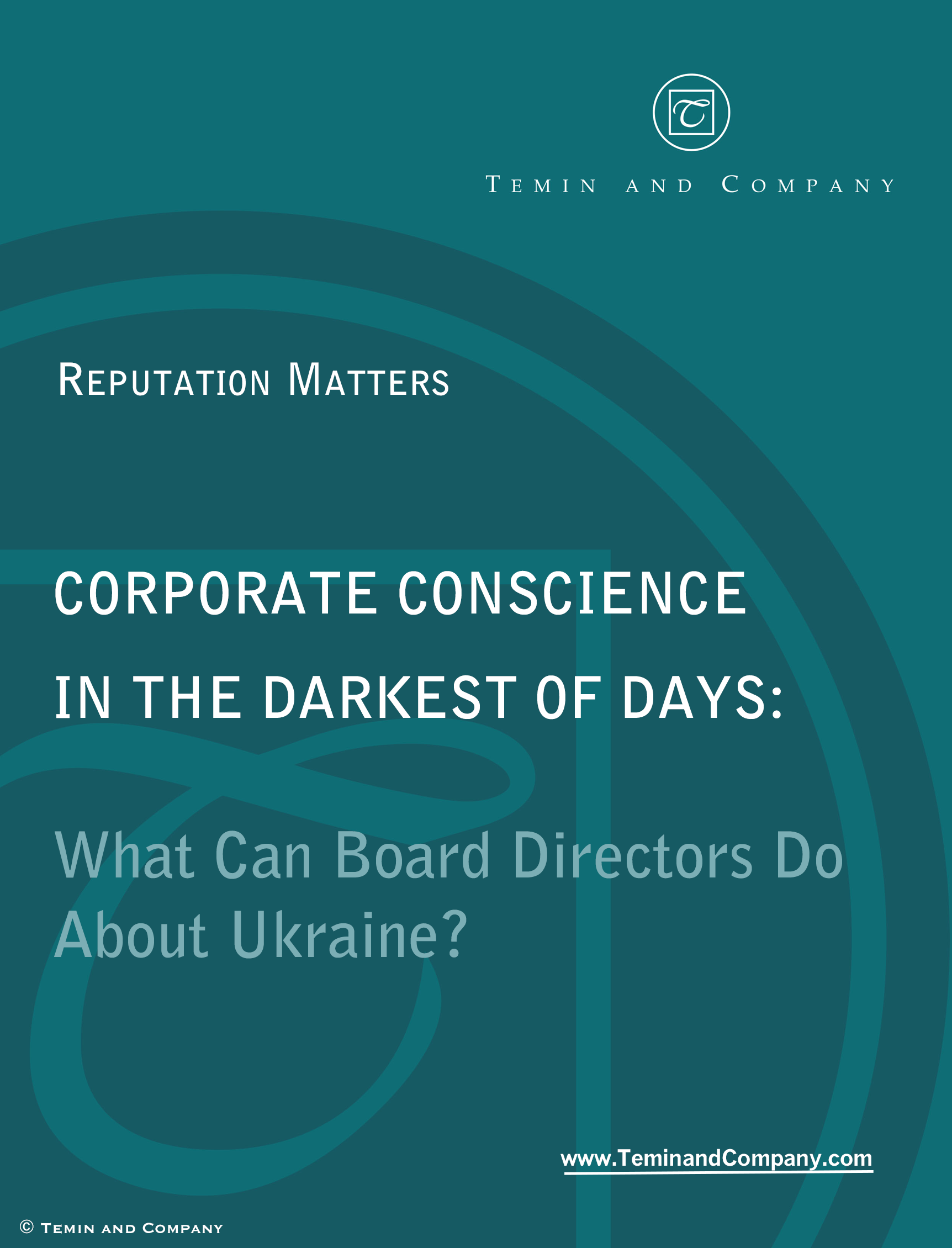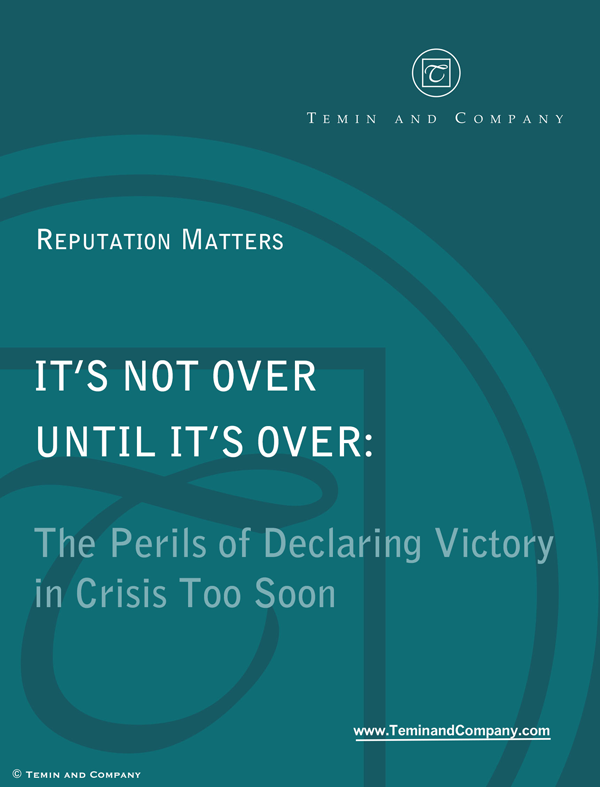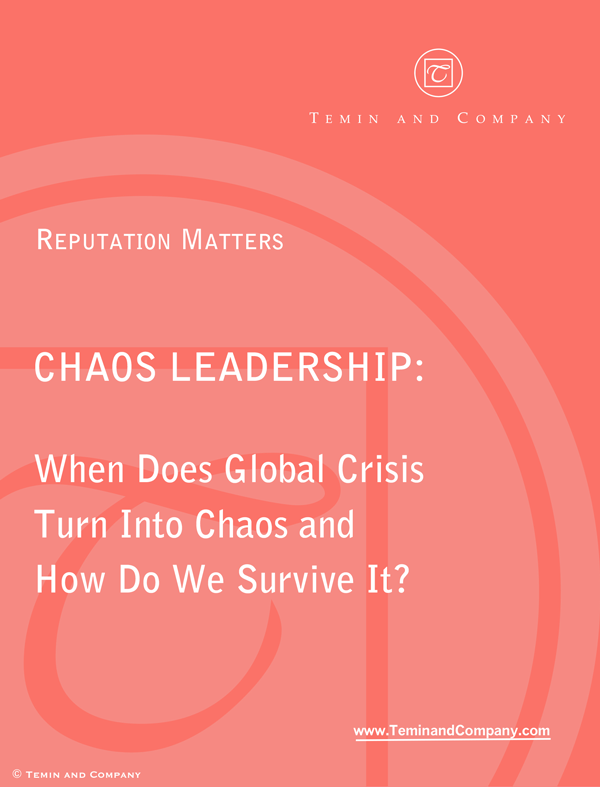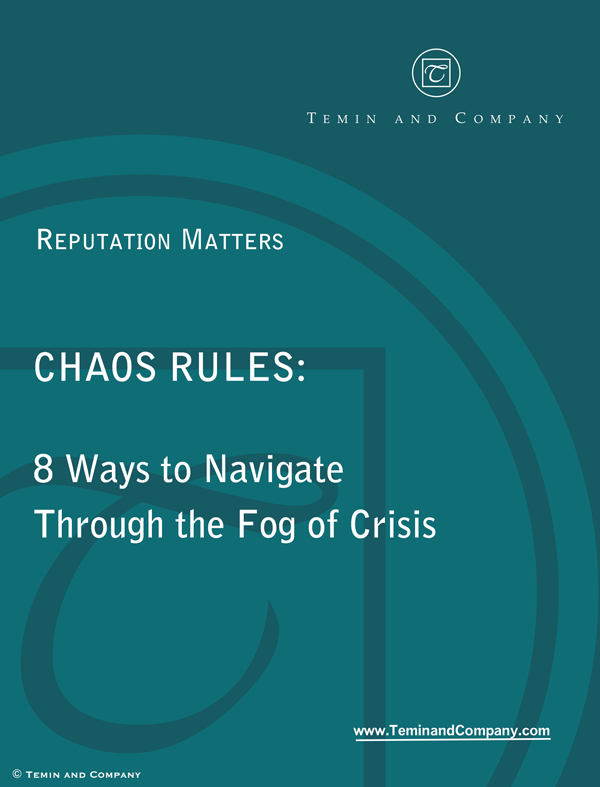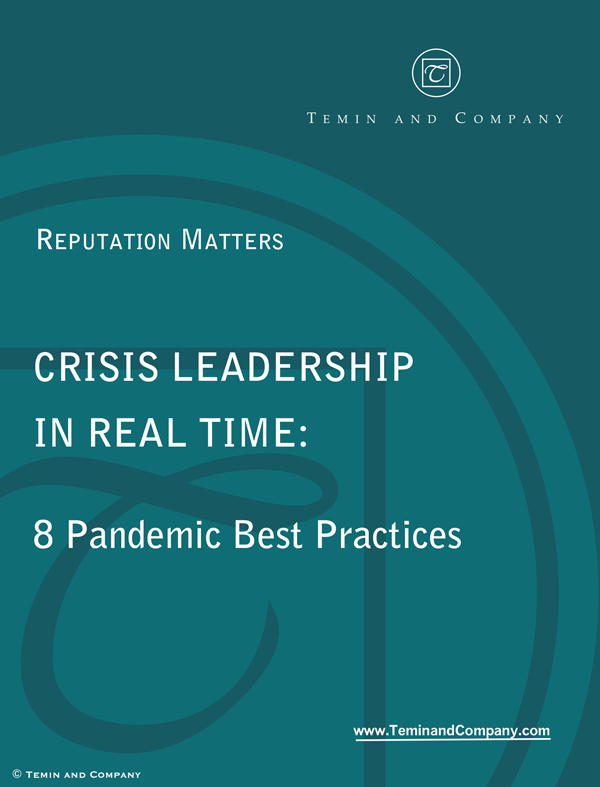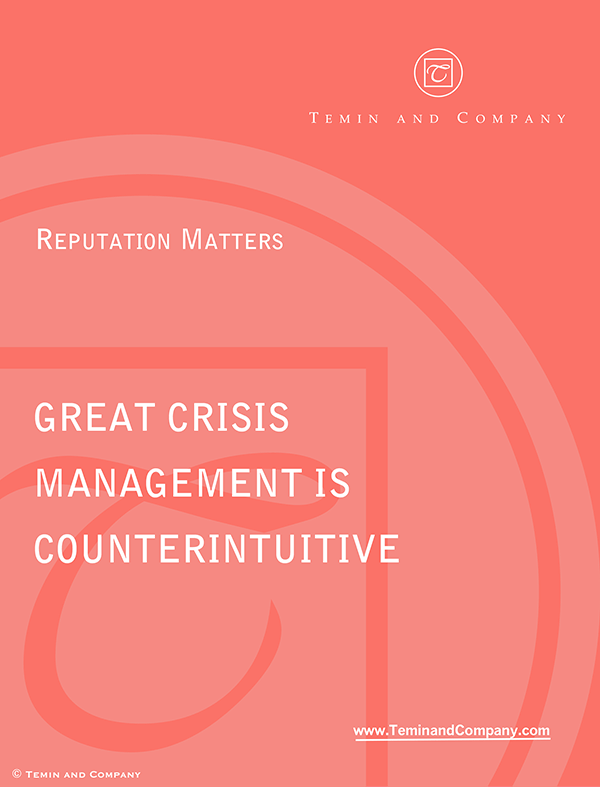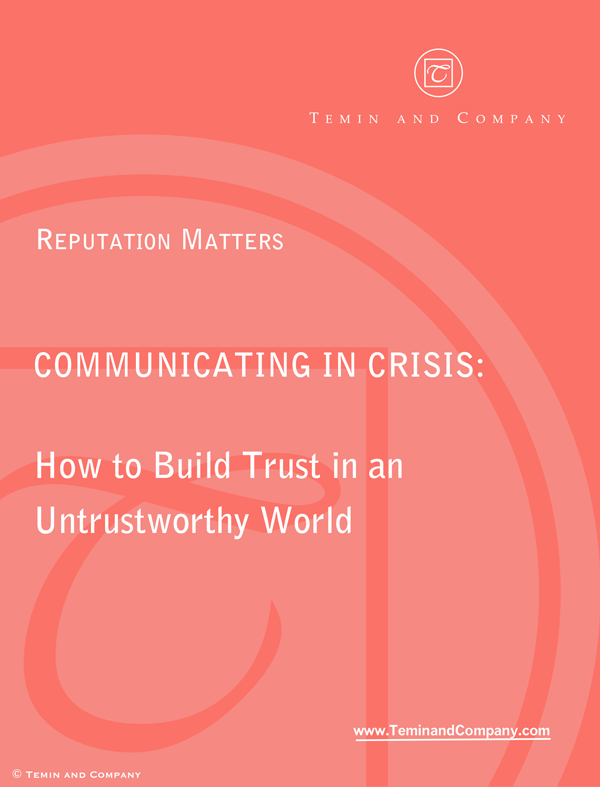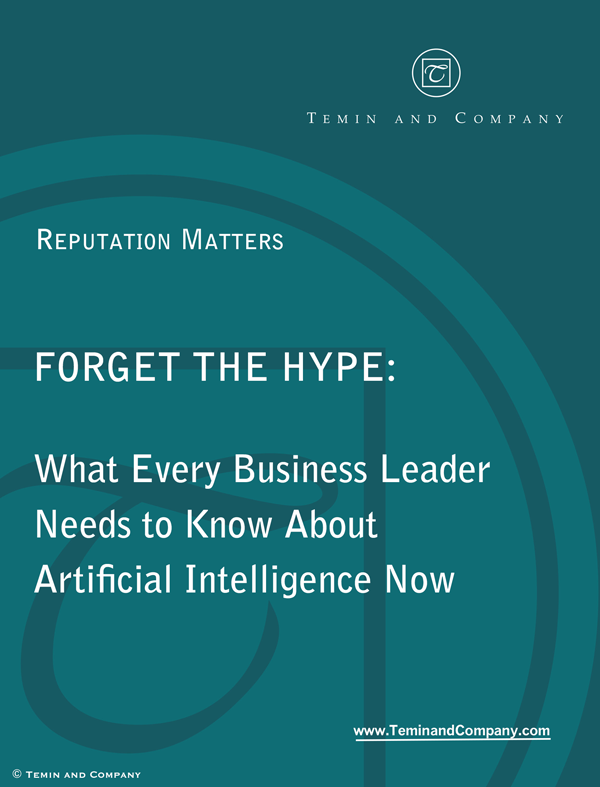Thought Leadership
White Papers»
"Reputation Matters" White Papers seek to offer deeper insight on a wide range of topics we help clients address.
Specialists in marketing through ideas, information, and insight, Temin and Company turns clients’ intellectual capital into true thought leadership.
We also seek to practice what we preach.
Temin and Company’s own thought leadership includes white papers, yearly client letters and podcasts, published articles, a Forbes.com column – Reputation Matters, Huffington Post and American Banker articles, and appearances in other news articles and broadcasts.
Further, Davia Temin is a frequent public speaker and moderator – for clients, their own client events, and their “high potential” training programs. She also presents regularly at CEO conferences, and has developed a range of “Crisis Game” role play simulations to prepare CEOs, Boards, and client companies for real-life crisis situations.
What Mark Zuckerberg Should Have Said
Leadership, “Reputation Matters,” Forbes, March 23, 2018

You know that Marianne Williamson quote: “Our deepest fear is not that we are inadequate. Our deepest fear is that we are powerful beyond measure?” Well so it is with Facebook. It turns out Facebook is far, far more powerful than any of us — even they, even Mark Zuckerberg — ever thought.
And with such awesome power comes awesome responsibility.
This week, Facebook shirked that responsibility through its terribly late and insufficient response to the Cambridge Analytica data hijacking scandal.
As a crisis advisor and coach who has crafted hundreds of what I hope are truly on-point, effective, and emotionally resonant crisis responses, here’s what I wish Mark Zuckerberg had done to give the world a response worthy of a Facebook’s vast global power and influence. […read more]
A 15-Point Plan For Boards And CEOs To Eradicate Sexual Harassment In Their Organizations
Leadership, “Reputation Matters,” Forbes, January 17, 2018
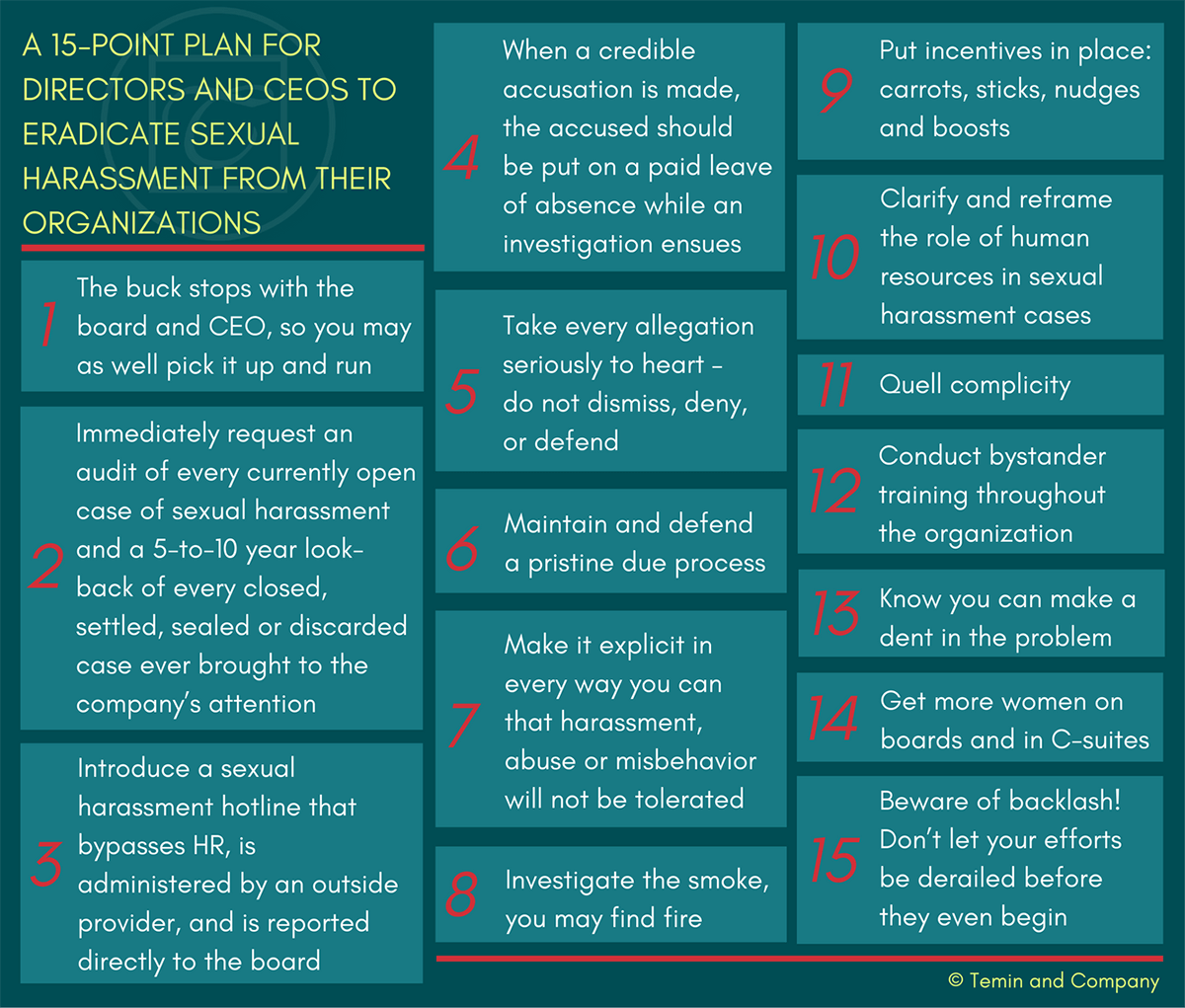
As organizations wait for the next wave in the tsunami of sexual abuse charges that is rocking American business, board directors and C-suite executives are fixated not only on understanding their risk exposure, but on what they can do to get ahead of the issue.
The only solution – and the right solution of course – is for leaders of all stripes to seriously take up the challenge of quashing sexual harassment in their workplaces for good.
Davia Temin’s “15-Point Plan To Eradicate Sexual Harassment In Your Organization” is an actionable, and easy-to-execute game plan for serious boards and executives. […read more]
Poisoned Apple Antidote: 11 Ways For Apple To Recover Trust After Its Battery Slowdown Crisis
Leadership, “Reputation Matters,” Forbes, December 31, 2017
The past several weeks have seen a string of mounting customer allegations against Apple, accusing the company of planning the obsolescence of its older 6 series iPhones through its last updates that limited those phones’ battery power and slowed them down significantly.
After radio silence, on Thursday December 28th, Apple finally posted a plausible explanation of why the last update indeed does hobble performance, and an apology, clearly trying to contain the reputational damage it has sustained.
While that explanation is a perfectly adequate one – it is too little, too late. […read more]
Getting Intelligent About Artificial Intelligence: 6 Ways Executives Can Start
Davia Temin, Bruce Molloy, Jayanth Kolla, Leadership, “Reputation Matters,” Forbes, December 8, 2017

This past June, Fortune Magazine asked all the CEOs of the Fortune 500 what they believed the biggest challenge facing their companies was. Their biggest concern for 2017: “The rapid pace of technological change” said 73% of those polled, up from 64% in 2016. Cyber security came in only a far second, at 61%, even after all the mega hacks of the past year.
So, what does “technological change” entail? For almost all Fortune 500 CEOs, it means, in part, artificial intelligence. And, as we wrote in our piece yesterday on Forbes.com, “Forget The Hype: What Every Business Leader Needs To Know About Artificial Intelligence Now,” AI is on the lips of almost every global CEO and Board of Directors.
But apart from the Big 8 technology companies – Google, Facebook, Microsoft, Amazon, IBM, Baidu, Tencent, and Alibaba – business leaders, especially of earlier generations, may feel they don’t know enough about AI to make informed decisions.

We made a series of 6 suggestions of how board members and C-suite executives can begin to understand this brave new world of AI, Machine Learning, and Deep Learning. And, after being asked by a number of people to break that list out for them, we include it, slightly modified, here. […read more]
Forget The Hype: What Every Business Leader Needs To Know About Artificial Intelligence Now
Davia Temin, Bruce Molloy, Jayanth Kolla, Leadership, “Reputation Matters,” Forbes, December 6, 2017

Artificial Intelligence – it’s on the lips of the leaders, and on the 2018 agendas of the board meetings, of almost every global company today. Directors and operating executives alike know, or think they know, that this “new electricity” is going to be the next transformative force of our world. To ignore it now could be fatal to their long-term competitive position, not to mention survival.
AI-powered companies that know what they are doing — primarily born in the Internet and mobile eras — have not only gained tremendous advantage in improved efficiency and increased profitability, they have literally changed the competitive landscape of successive industries. And they are continuing to do so, as they venture into new fields, challenging a whole new set of incumbents that are not AI “natives.” (Witness Google’s Launchpad Studio’s focus on healthcare AI startups, and Alphabet’s Waymo autonomous cars, to name only two.) […read more]
How Boards Should Handle a CEO Scandal
Chief Executive, October 24, 2017
It used to be that a founding CEO could be excused all manner of misbehavior by his or her board, as long as it was kept quiet and the bottom line was not negatively impacted. In my 20 years as founder and CEO of a boutique crisis management firm, I have dealt with well over 60 cases of CEO dismissal, and an equal number of case where the CEO did not get dismissed. It used to be that the board might either tolerate bad behavior, or publicly support a CEO while privately chastising him relentlessly. Regardless, he or she would stay.
More recently, however, given the outsized attention to serious CEO misbehavior, boards really have little choice—they must react, and act, quickly and decisively. In the brave new world of 24-hour news cycles and social media commentary that transits the globe at the speed of light, no CEO is invulnerable or—once found to be guilty of ethical violations—irreplaceable.
Boards need to keep ahead of the public humiliation and loss of reputational equity caused by major CEO misbehavior or malfeasance. If they deny, or stall, they run the risk of ruining their company and turning themselves into the targets of shareholders’ and the public’s bloodlust. […read more]
Equifax: A Category 5 Cybersecurity Crisis Storm. Chances Are It Will Hit You
Leadership, “Reputation Matters,” Forbes, September 9, 2017
You would really think that by now companies in crisis could get it right the first time.
But no, as Equifax announced its epic Category 5 Crisis — the cyberhack of 143 million consumers’ social security numbers, drivers’ license numbers, birthdates, addresses and credit card numbers affecting at least 44% of the American population — after stalling over a month to stop the hack and prepare for the onslaught of a public announcement, clearly got the apology algorithm all wrong anyway. Did they think no one would notice?
From a tepid apology from CEO Richard Smith — totally incommensurate with the size of the crisis — to a completely botched announcement of remediation, tying use of their free credit monitoring to forfeiting the right of a trial and mandating arbitration, they just got everything wrong.
Whenever you come out of the gate wrong in a crisis — either minimizing the problem, putting forth a totally tone-deaf message, trying to pull a fast one on your consumers by limiting your liability, or retaining some of your breezy marketing messages in the face of category 5 devastation — you court the fury of your customers, the public, regulators and investors.
Here’s what Equifax has done wrong — so far. […read more]
The Only Adults In The Room: Why Business Leaders Rose To The Challenge And Led The Country
Leadership, “Reputation Matters,” Forbes, August 27, 2017
For a supposedly slow month, August has seen quite a lot of action in the C-Suites and Boardrooms of America. As CEOs bailed out of the White House Industry Councils, protesting President Trump’s insufficient condemnation of events in Charlottesville, they filled a void — taking on a national leadership role whether they wished to or not. No one from the Cabinet or Congress was rising to the occasion, so in the midst of national crisis, business leaders proved themselves to be the only adults in the room.
Ever concerned about achieving favorable tax legislation, maintaining a stable economy, and paving the way for global expansion, corporate America has always had a major stake in how Washington operates. In some administrations relations have been more strained, and in others more collegial. But rarely have corporate leaders felt the need to exit en masse from White House-sponsored advisory councils, such as happened this month. […read more]
Uber CEO Kalanick’s Resignation Is Not The Best Answer
Leadership, “Reputation Matters,” Forbes, June 21, 2017
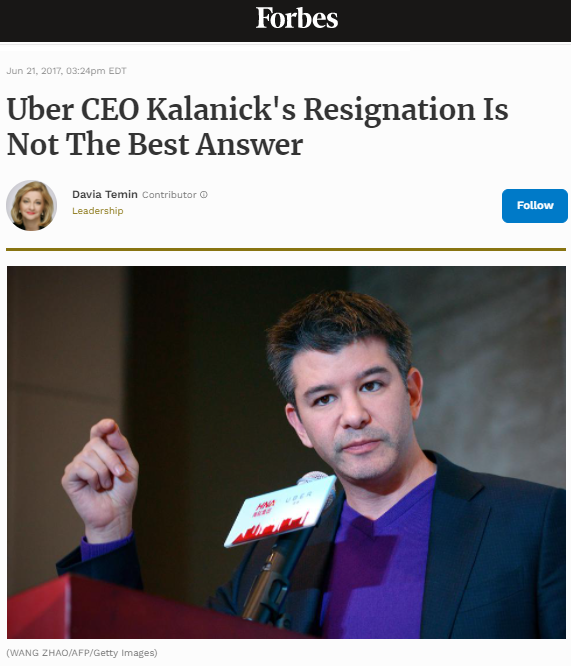
I am sad that Travis Kalanick had to resign. As news of the Uber CEO’s resignation is digested by the world’s media analysts and leadership pundits, I would like to put forth a contrarian point of view – especially coming from such an outspoken advocate of gender equity in organizations. I do not think this is the biggest win that we who are interested in a bias and harassment-free workplace could have hoped for. Not by a long-shot.
Reformation vs. Resignation
Kalanick’s reformation would have been such a more powerful and optimistic story. It would have shown that, yes, personal transformation is possible, even among tone-deaf, frat-boy, start-up executives. And it could have shown that once a leader is made to, and allowed to, grow up, he or she can own it, and then transform a culture. […read more]
Dear Uber, Here Are 11 Ways You Can Fix Your Culture To Support Women Right Now
Leadership, “Reputation Matters,” Forbes, June 18, 2017
To rephrase Madeleine Albright: There is a special place in heaven for men — and women — who help other women. But for Uber, and so many other organizations, their cultures are in need of an essential transformation before they even begin to find their place in the firmament.
Of course Uber is not the only company to sport a “bro” culture that can be antithetical to women executives’ presence, progress, and well-being. They’re just one of the most flagrant.
So, as Arianna Huffington and Eric Holder began to publicly reign in the executive office, and board, I began to think of what it would really take for Uber, and other organizations, to immediately empower, support and profit from the women in their workforce. I decided that this, drawn from over 25 years’ experience as a coach, reputation manager, and CEO dedicated to promoting women and girls’ leadership at every level, would be the topic of my remarks: 11 Ways To Support the Women in Your Organization and Life. I am pleased to share it with you today. […read more]
White Papers»
"Reputation Matters" White Papers seek to offer deeper insight on a wide range of topics we help clients address.




